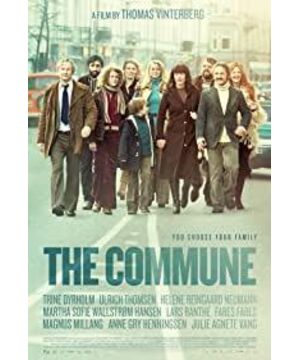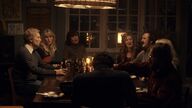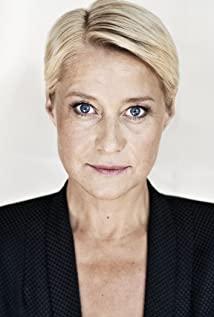The story takes place in Copenhagen in the 1970s. The male protagonist is a professor of architecture (DaDa~). He forms a family of three with his wife and teenage daughter, and "inherited" (in fact it was a purchase/rental?) his father stayed. For the next villa with an area of more than 400 square meters, due to the large residential area and high rent and maintenance costs, his wife discussed with him and suggested inviting some relatives and friends to live with. By invitation and interview, they formed a "community" composed of seven adults, one teenager (daughter) and one child (little boy) in the villa. The commune has its own regulations and members must vote on important matters. I thought the story would revolve around these seven adults and two children. In fact, it’s the same. It’s just the "adults" part, focusing only on the heroes and heroines. In the end, it seems that the characters and personalities of other commune members are not full enough. , Is also one of my dissatisfaction with this film. The director not only did not focus on expressing the various members of the commune, but instead introduced a new member, the "best eighth (third) person", and focused his attention on her, making the structure of the "community" nothing more than one The structure of the love triangle is enlarged. Is there anything special about this extramarital love/triangle? I don't think so. Its uniqueness is only being placed in an environment like the "community".
The director put a lot of energy into telling this extramarital affair: telling how the male protagonist fell in love with his female college student, and then the impact on his wife, how the daughter responded, how the commune members responded, how the final matter was resolved, and so on. Although I don't want to admit it, this is the main thread of the story. The topic of the extramarital love story itself can be said to be a mess: the husband fell into a passion for young female college students while reluctant to part with his wife and daughter with deep affection; the wife (in a free and communist posture) "tolerant" Accepting female college students, but ultimately intolerable and severely affected her work, spirit and life; her daughter witnessed everything in the home, while conducting her own exploration and experience of love and sex in private, and at the same time with extraordinary experience. Reason gives the mother's seemingly cruel advice-the clever plot setting is that the most "rational" among the members of the commune is the daughter of the three-person extramarital affairs. Although living in a commune, all members are like a family, but the real housework is determined by real family members.
Such a main story line does not sound amazing, but in the director's shots, it is quite thrilling to be told. The close-up shots are abundant (if I remember correctly)-the number is large and the lens is unique, which makes me realize how to use the close-up shots to enhance the atmosphere and tap the characters' hearts. Who are the close-ups given? Needless to say, the heroes and heroines, the other impressed is the daughter and the little boy, oh, and the female college student's slightly hollow eyes (I think this actor is the worst performer)-these characters are the director's strong focus The object to be portrayed.
Despite regrets and dissatisfaction, I think the script of this film is at least promissing. It tells serious topics into a comedy, and creates really interesting dialogues and laughable passages. In addition to the merits of the script, it is also closely related to the superb performance of the actors. Indivisible. I also imagined what kind of story would I tell if the commune in the 1970s was set as the background? Is it possible to tell a story about leaving the old tone of extramarital affair, and showing the unspeakable relationship between family members and between people from a strange and detailed perspective? It's hard to give an answer.
(About the PS of the script. After all, because the male protagonist is engaged in architecture, for me, there is still a sense of substitution...especially when female college students show off to him about Le Corbusier’s modulor, the male The Lord said, you have read a lot of books, but I didn’t see your thinking. What are you interested in?-It’s like a PhD instructor's wording.)
I like the way of mirroring in this film, there are some traces of hand shaking , To draw the distance between the audience and the story very close. The lighting and setting are good, and the tonal adjustment of the film is also great, but the soundtrack is slightly inferior, sometimes it is very entertaining, and sometimes it is abrupt and uncoordinated. At the end of the film, everyone celebrates at the dinner table and the little boy has a heart attack. The joyous and comedic soundtrack (very good) makes the heart warm in the saddest loss-well, the director is here I didn't want to criticize and expose anything, and I didn't want to suppress it. I just showed my life in a gentle and witty tone.
I don’t know how many viewers are like me. In this year’s "desolate" Berlinale, I think this film is the most visible main competition unit. The audience burst into laughter from time to time, and from time to time the audience could hear the audience holding their breath, and finally there was thunderous applause. The girl next to me was still in tears, which made me feel very sensational.
But this kind of thing that has nothing to do with politics, obviously can't get a little golden bear, I hope I can get one/several silver bears~
View more about The Commune reviews











